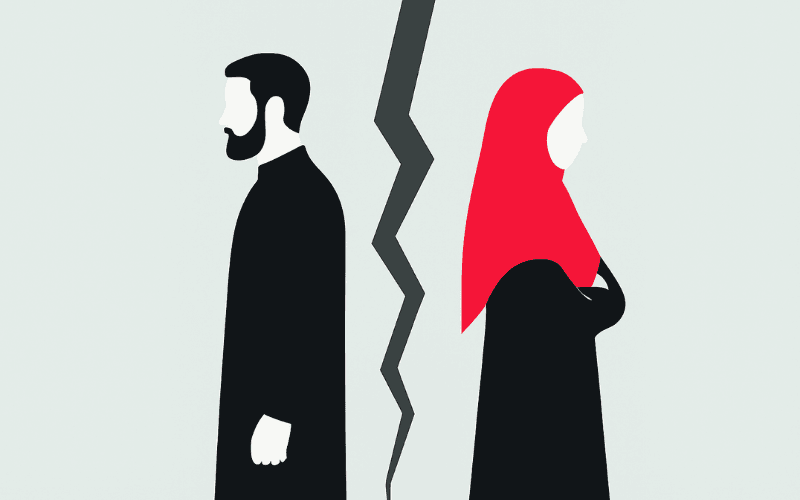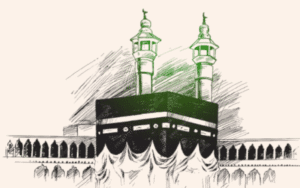Divorce in Islam: What the Quran and Sunnah Say

Islam is a complete way of life. It provides clear guidance for every aspect of human existence. At the core of this system is the family, and the foundation of the family is marriage. Islam holds marriage as a sacred covenant (mithaqan ghaliza). It is not merely a means to fulfill biological needs but a profound institution for tranquility, love, and the preservation of lineage. The Almighty Allah states:
وَمِنْ آيَاتِهِ أَنْ خَلَقَ لَكُم مِّنْ أَنفُسِكُمْ أَزْوَاجًا لِّتَسْكُنُوا إِلَيْهَا وَجَعَلَ بَيْنَكُم مَّوَدَّةً وَرَحْمَةً
“And of His signs is that He created for you from yourselves mates that you may find tranquility in them; and He placed between you affection and mercy.”
(Quran, Surah Ar-Rum: 21)
Islam’s primary objective is to preserve the marital bond for a lifetime. However, Islam does not ignore reality. Situations can arise where a relationship becomes a source of unbearable pain, not peace. When living together becomes impossible, Islam provides an honorable path to exit this toxic relationship. This final measure is known as Talaq. Although Divorce in Islam is a permissible option, it is a deeply serious matter. The faith considers it the most detestable of all lawful acts. To emphasize its gravity, the Messenger of Allah (ﷺ) said:
“The most detestable of lawful things before Allah is divorce.”
(Sunan Abu Dawood, Hadith: 2178)
This article will present a complete picture of the philosophy of divorce in Islam. We will cover its prerequisites, types, methods, and the rights and responsibilities of each party, all in the light of the Quran and Hadith.
Precursors to Divorce: Islamic Steps for Reconciliation
Islam does not view divorce as a sudden or emotional decision. It has prescribed a specific course of action to save a relationship before anyone resorts to this final step. Following these steps is essential.
- Counsel and Admonition (Al-Wa’dh): When problems arise in a marriage, spouses should first advise each other with wisdom (hikmah) and love. They should admit their mistakes, forgive one another, and try to mend the relationship. This involves reminding each other of their duty to Allah.
- Temporary Separation in Bed (Al-Hajr fi al-Madaji’): If counseling fails, the husband may temporarily separate from his wife’s bed as a gentle form of protest. The purpose is not to punish. Instead, it aims to make the wife realize the seriousness of her actions and encourage her to refocus on the marriage.
- Arbitration (At-Tahkim): If the first two steps do not resolve the conflict, the relationship may be on the brink of collapse. Before a final decision, they must appoint a wise and just arbitrator from each of their families. These arbitrators will listen to both sides impartially and attempt to reach an honorable resolution. This is a direct command from the Quran.
وَإِنْ خِفْتُمْ شِقَاقَ بَيْنِهِمَا فَابْعَثُوا حَكَمًا مِّنْ أَهْلِهِ وَحَكَمًا مِّنْ أَهْلِهَا إِن يُرِيدَا إِصْلَاحًا يُوَفِّقِ اللَّهُ بَيْنَهُمَا ۗ إِنَّ اللَّهَ كَانَ عَلِيمًا خَبِيرًا
“And if you fear dissension between the two, send an arbitrator from his people and an arbitrator from her people. If they both desire reconciliation, Allah will cause it between them. Indeed, Allah is ever Knowing and Acquainted [with all things].”
(Quran, Surah An-Nisa: 35)
Only after all these efforts have failed does the question of divorce arise. This process proves how deeply invested Islam is in preserving the family unit.
Methods of Divorce in Islam: A Juristic Overview
Islamic jurisprudence categorizes divorce from various perspectives. We discuss the main classifications in detail below.
Classification by Method
This classification is based on the procedure used to pronounce the divorce.
🕌 A) Talaq as-Sunnah (The Prophetic and Recommended Method): This is the best method of divorce in Islam, supported by the Quran and the Sunnah (Prophetic tradition). It has two forms:
1) Talaq al-Ahsan (The Best Method): This is the most beautiful and commendable method. The procedure is as follows:The husband pronounces a single divorce to his wife. He must do this during her state of purity (tuhr) in which they have not had intercourse.After this single pronouncement, he allows her to complete her waiting period (Iddah) and does not expel her from the home.During the Iddah, the husband can revoke the divorce at any time. He can take her back as his wife (ruju’) without needing a new marriage contract. If the Iddah period ends without revocation, the divorce becomes final. The greatest advantage of this method is that it gives both spouses a long time for reflection, self-correction, and reconciliation. Allah says:
يَا أَيُّهَا النَّبِيُّ إِذَا طَلَّقْتُمُ النِّسَاءَ فَطَلِّقُوهُنَّ لِعِدَّتِهِنَّ … لَا تَدْرِي لَعَلَّ اللَّهَ يُحْدِثُ بَعْدَ ذَٰلِكَ أَمْرًا
“O Prophet, when you [Muslims] divorce women, divorce them for [the commencement of] their waiting period… You know not; perhaps Allah will bring about after that a [different] matter.”
(Surah At-Talaq: 1)
2) Talaq al-Hasan (The Good Method): In this method, the husband pronounces divorce three times. He does so once in three separate periods of purity. For instance, one divorce in the first state of purity, a second in the next, and a third in the one after. The marriage is irrevocably dissolved upon the third pronouncement.
🚫 B) Talaq al-Bid’ah (The Disapproved and Innovated Method): This method contradicts the Sunnah. Islam strictly condemns it, although most jurists agree that it takes effect. Its forms include:
- Pronouncing three divorces in a single sitting or with a single statement (e.g., saying “I divorce you three times”).
- Divorcing a wife during her menstrual period (hayd) or post-childbirth bleeding (nifas).
- Divorcing a wife in a state of purity during which intercourse has occurred. The Messenger of Allah (ﷺ) deeply disliked this type of divorce in Islam. When a man divorced his wife with three pronouncements at once, he (ﷺ) became angry and said:
“Is the Book of Allah being trifled with while I am still among you?”
(Sunan an-Nasa’i, Hadith: 3401)
Historical Context and Juristic Differences: During the time of the Prophet (ﷺ), Abu Bakr (RA), and the first two years of Umar’s (RA) caliphate, three divorces given at once counted as one revocable divorce. Later, people began to take divorce lightly and misuse it. Caliph Umar (RA), as an administrative measure to deter them, enforced it as three separate divorces. For this reason, the Imams of the four major schools of thought hold that three divorces pronounced together count as three. However, Imam Ibn Taymiyyah and many Salafi and modern scholars consider it as only one, reflecting the complexity of Islamic divorce laws.
Finality and Revocability in Divorce in Islam
Based on the possibility of reconciliation, Talaq is of two types:
1. Talaq ar-Raj’i (Revocable Divorce) This refers to the first or second pronouncement of divorce. After this, the husband retains the right to take his wife back during her waiting period (Iddah). This reconciliation (ruju’) does not require a new marriage contract or dower. A verbal statement like “I take you back” or resuming marital relations is sufficient. Allah states:
وَبُعُولَتُهُنَّ أَحَقُّ بِرَدِّهِنَّ فِي ذَٰلِكَ إِنْ أَرَادُوا إِصْلَاحًا
“And their husbands have more right to take them back in that period if they want reconciliation”
(Surah Al-Baqarah: 228)
2. Talaq al-Ba’in (Irrevocable Divorce) This is a divorce after which reconciliation through ruju’ is not possible. A new marriage contract is required if reunion is permissible. It has two categories:
Ba’in Sughra (Minor Irrevocable Divorce): This occurs when the Iddah of a revocable divorce expires, or through a Khula. It also happens when a divorce is given before the consummation of the marriage. In this case, the marriage tie is severed. However, the couple can remarry each other with a new marriage contract and a new dower.
Ba’in Kubra (Major Irrevocable Divorce): This occurs when a husband divorces his wife for the third time. In this case, the couple cannot remarry each other unless a strict condition is met. The woman, after completing her Iddah, must genuinely and permanently marry another man. If her second husband voluntarily divorces her or passes away after consummating the marriage, only then can she remarry her first husband. The Quran describes this process:
فَإِن طَلَّقَهَا فَلَا تَحِلُّ لَهُ مِن بَعْدُ حَتَّىٰ تَنكِحَ زَوْجًا غَيْرَهُ
“And if he has divorced her [for the third time], then she is not lawful to him afterward until she marries a husband other than him…”
(Surah Al-Baqarah: 230)
💡 Note: Some people distort this natural process by arranging a pre-planned, contractual marriage known as ‘Hilla’. This is a forbidden (haram) and cursed act. The Prophet (ﷺ) cursed both the man who performs the Hilla marriage and the man for whom it is performed
(Jami` at-Tirmidhi, Hadith No: 1119, 1120).
The Iddah: A Period of Waiting and Wisdom
After a divorce takes effect, the wife must observe an obligatory (fard) waiting period called the Iddah. This period serves multiple purposes:
- To ascertain if the womb is clear, removing any doubt about a child’s paternity.
- To provide an opportunity to recover from the significant emotional trauma of divorce in Islam.
- To create a window for both spouses to feel remorse and reconsider their decision.
The duration of the Iddah varies based on the situation:
- For a woman who menstruates:
وَالْمُطَلَّقَاتُ يَتَرَبَّصْنَ بِأَنفُسِهِنَّ ثَلَاثَةَ قُرُوءٍ
“Divorced women shall wait concerning themselves for three monthly periods.”
(Surah Al-Baqarah: 228) - For a woman who has stopped menstruating:
وَاللَّائِي يَئِسْنَ مِنَ الْمَحِيضِ مِن نِّسَائِكُمْ إِنِ ارْتَبْتُمْ فَعِدَّتُهُنَّ ثَلَاثَةُ أَشْهُرٍ
“And those who no longer expect menstruation among your women – their period is three months” (Surah At-Talaq: 4) - For a pregnant woman:
وَأُولَاتُ الْأَحْمَالِ أَجَلُهُنَّ أَن يَضَعْنَ حَمْلَهُنَّ
“And for those who are pregnant, their term is until they give birth.”
(Surah At-Talaq: 4) - For a widow:
يَتَرَبَّصْنَ بِأَنفُسِهِنَّ أَرْبَعَةَ أَشْهُرٍ وَعَشْرًا
“They wait concerning themselves for four months and ten days.”
(Surah Al-Baqarah: 234) - If divorce occurs before consummation:
فَمَا لَكُمْ عَلَيْهِنَّ مِنْ عِدَّةٍ تَعْتَدُّونَهَا
“then you have no waiting period over them to count.”
(Surah Al-Ahzab: 49)
Rights of a Divorced Woman Under Islamic Divorce Laws
Islam does not abandon a divorced woman to helplessness. Instead, it grants her multiple rights to ensure her dignity and financial security, which is a cornerstone of Islamic divorce laws.
1. Full Dower (Mahr): If the dower from the marriage has not been paid, the husband must pay it in full after the divorce. If it was partially paid, he must settle the remainder. A deferred dower (mu’ajjal) becomes immediately due upon divorce. This is the wife’s exclusive right, and failure to pay it is a debt and a sin.
2. Maintenance and Residence During Iddah (Nafaqah & Sukna): The divorcing husband is fully responsible for the woman’s food, clothing, medical care, and housing throughout her Iddah. She remains in her husband’s home during a revocable divorce, which creates an opportunity for reconciliation.
3. Consolatary Gift (Mata’a): It is a virtuous act for the husband to give his wife a gift or financial benefit. This acts as a gesture of respect for the hardship she faces. Allah says:
وَلِلْمُطَلَّقَاتِ مَتَاعٌ بِالْمَعْرُوفِ ۖ حَقًّا عَلَى الْمُتَّقِينَ
“And for divorced women is a provision according to what is acceptable – a duty upon the righteous.”
(Surah Al-Baqarah: 241).
Sharia does not prescribe a fixed amount. The husband should determine it based on his financial capacity and the wife’s social standing. Though often neglected, it is a crucial financial and emotional support.
4. Child Custody and Maintenance (Hadanah & Nafaqah):
- Custody (Hadanah): Generally, the mother has the right to physical custody of her children up to a certain age.
- Maintenance (Nafaqah): The father is 100% responsible for the children’s financial support, even if they are in the mother’s custody. This continues until the children become self-sufficient adults. It includes all expenses for their food, clothing, housing, education, and healthcare. This is a clear mandate in Islamic divorce laws.
Wife-Initiated Divorce in Islam and Special Circumstances
Islam does not only grant men the right of divorce. It also empowers women to seek separation under specific circumstances, a key feature of Islamic divorce laws.
1. Khula: If a wife no longer wishes to live with her husband for any reason, she can seek a divorce. She does so in return for compensation, such as by returning her dower (Mahr). The hadith of the wife of Thabit ibn Qays (RA) is the primary evidence for this. The Prophet (ﷺ) instructed him to accept the return of his garden and grant the divorce (Sahih al-Bukhari, Hadith No: 5273).
2. Tafwid al-Talaq (Delegated Divorce): A husband can delegate the right to pronounce divorce to his wife. He can do this in the marriage contract or during the marriage, often with certain conditions. If he grants this right, the wife can pronounce divorce upon herself if the conditions are met.
3. Faskh an-Nikah (Judicial Annulment of Marriage): The word Faskh means “to annul.” In Islamic terminology, it is the dissolution of a marriage by an Islamic judge or court for a valid reason. It is different from Talaq or Khula because the decision comes from a judicial authority. It does not require the husband’s consent. This is a powerful provision in Islam to protect women’s rights. A woman can petition a court for Faskh on grounds such as:
- Failure of the husband to provide maintenance.
- Prolonged absence or desertion by the husband.
- Physical or emotional cruelty that constitutes oppression (zulm).
- The husband suffering from a dangerous or debilitating disease.
- The husband’s permanent inability to fulfill his marital duties.
4. Li’an (Dissolution Through Mutual Imprecation): Li’an means “mutual cursing.” It is a specialized procedure for when a husband accuses his wife of adultery (zina) but cannot produce four witnesses. The Quran describes the procedure in Surah An-Nur: 6-9. Once this process is completed, the judge will dissolve their marriage permanently.
5. Zihar and Ila (Acts That Can Lead to Divorce): Zihar and Ila are not direct forms of divorce, but they can lead to dissolution.
- Zihar: This occurs when a husband compares his wife to a permanently unmarriageable female relative. This is a grave sin. He cannot resume marital relations until he performs penance (kaffarah). If he fails, the wife can seek a judicial divorce.
- Ila: This is when a husband takes an oath not to have sexual relations with his wife for four months or more. If the four months pass and he does not resume relations, the wife has the right to demand a divorce through the court.
The Social Impact of Divorce in Islam and Coping
Beyond legal aspects, the psychological and social impact of divorce in Islam is profound.
Emotional Trauma and Healing: Divorce is a significant emotional blow for both spouses. Women, in particular, often face social stigma. During this difficult time, one must practice patience (sabr) and trust in Allah’s plan. Support from family and trusted friends can be immensely helpful. Seeking professional counseling may also be beneficial. Remember that the end of an unsuccessful relationship is not the end of life but an opportunity for a new beginning.
Impact on Children and Parental Responsibilities: Children are often the biggest victims of a divorce. It can have a long-term negative impact on their mental health. Therefore, the parents’ primary duty is to unite in their responsibilities toward their children despite their differences. They must refrain from blaming each other in front of the children. Both parents must provide adequate time and reassure them that their love and responsibility will not diminish. This will help maintain their emotional stability.
Conclusion
In Islam, divorce is not a simple solution but a final measure. It is only applicable when preserving a marriage becomes impossible and causes harm. One should not make this decision in a moment of anger or passion.
Islam has established a systematic, just, and humane method for divorce. These comprehensive Islamic divorce laws protect the rights of both parties, especially the woman’s dignity and financial security. The best method of divorce in Islam is the Talaq as-Sunnah, which leaves ample room for reconciliation. Every Muslim has a duty to refrain from innovated methods like pronouncing three divorces at once.
Above all, we must remember that a beautiful family and a peaceful marital life are among Allah’s greatest blessings. Therefore, instead of losing patience over minor problems, we should make every effort to sustain the relationship. We can do this through forgiveness, dialogue, and help from elders. Divorce should only ever be the last and final resort.
Frequently Asked Questions
Is divorce permissible in Islam?
Yes, divorce is a permissible option in Islam. However, it is considered the most detestable of all lawful acts in the sight of Allah. Islam views divorce as a last resort, to be used only when all attempts at reconciliation have failed and the marital relationship has become an unbearable source of pain.
What are the recommended steps for reconciliation before a divorce?
Islam encourages spouses to take a systematic approach to resolving marital conflicts to avoid divorce. The recommended steps are:
- Counsel and Admonition: Spouses should first advise and forgive each other with wisdom and love.
- Temporary Separation: If counseling fails, a temporary separation in bed can serve as a gentle protest to encourage a change in behavior.
- Arbitration: If the conflict persists, an impartial arbitrator from each family should be appointed to mediate and attempt a reconciliation.
What is the best method of divorce in Islam?
The best and most recommended method of divorce is Talaq al-Ahsan. This involves a husband pronouncing a single divorce to his wife during her state of purity, in which there has been no intercourse. He then allows her to complete her waiting period (Iddah) without expelling her from the home. This method provides a long window for reflection and possible reconciliation.
What are the rights of a divorced woman in Islam?
Islamic divorce laws grant a divorced woman several rights to ensure her dignity and financial security:
- Full Dower (Mahr): The husband must pay the full dower, whether it was deferred or not yet paid.
- Maintenance and Residence: The husband is responsible for her full financial support and housing throughout her waiting period (Iddah).
- Child Custody and Maintenance: The mother typically has the right to physical custody of the children, while the father remains 100% responsible for all of the children’s financial needs, including housing, food, and education, until they become adults.









